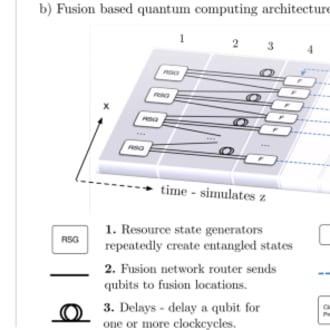
10 Best Articles on Quantum Entanglement
The most useful articles on quantum entanglement from around the web, curated by thought leaders and our community.
Refind focuses on timeless pieces and updates the list whenever new, must-read articles or videos are discovered.
Top 5 Quantum Entanglement Articles
At a glance: these are the articles that have been most read, shared, and saved on quantum entanglement by Refind users in 2024 so far.
What is ...?
New to #quantum entanglement? These articles make an excellent introduction.
What is quantum entanglement? A physicist explains the science of Einstein’s ‘spooky action at a distance’
A multitude of experiments have shown the mysterious phenomena of quantum mechanics to be how the universe functions. The scientists behind these experiments won the 2022 Nobel Prize in physics.
What Is Entanglement and Why Is It Important?
Caltech scientists explain the strange phenomenon of quantum entanglement in everyday language.
What Is Quantum Entanglement?
Quantum bits (aka qubits), the reader is assured, are somehow "entangled" such that they rely on one another. If more detail is needed, we're told entanglement links qubits no matter how far apart they are—so long as the qubits are “coherent.” This hardly helps! So let's try a different approach.
Short Articles
Short on time? Check out these useful short articles on quantum entanglement—all under 10 minutes.
Brain experiment suggests that consciousness relies on quantum entanglement
New research indicates that consciousness may rely on quantum mechanics. Perhaps the brain does not operate in a "classical" way.
Does consciousness change the rules of quantum mechanics?
Maybe our understanding of quantum entanglement is incomplete, or maybe there is something fundamentally unique about consciousness.
Computer Science Proof Lifts Limits on Quantum Entanglement
Three computer scientists have solved the NLTS conjecture, proving that systems of entangled particles can remain difficult to analyze even away from extremes.
New Entanglement Results Hint at Better Quantum Codes
A team of physicists has entangled three photons over a considerable distance, which could lead to more powerful quantum cryptography.
Quantum Entanglement Has Now Been Directly Observed at a Larger Macroscopic Scale
Quantum entanglement is the binding together of two particles or objects, even though they may be far apart – their respective properties are linked in a way that's not possible under the rules of…
Long Articles
These are some of the most-read long-form articles on quantum entanglement.
Fusion-based quantum computation
Fusion gates are common operations in photonic quantum information platforms, where they are employed to create entanglement. Here, the authors propose a quantum computation scheme where the same…
Our simple, magic-free recipe for quantum entanglement
Why does the quantum world behave in that strange, spooky way? Here’s our simple, four-step explanation (no magic needed)
What is Refind?
Every day Refind picks the most relevant links from around the web for you. Picking only a handful of links means focusing on what’s relevant and useful.
How does Refind curate?
It’s a mix of human and algorithmic curation, following a number of steps:
- We monitor 10k+ sources and 1k+ thought leaders on hundreds of topics—publications, blogs, news sites, newsletters, Substack, Medium, Twitter, etc.
- In addition, our users save links from around the web using our Save buttons and our extensions.
- Our algorithm processes 100k+ new links every day and uses external signals to find the most relevant ones, focusing on timeless pieces.
- Our community of active users gets the most relevant links every day, tailored to their interests. They provide feedback via implicit and explicit signals: open, read, listen, share, mark as read, read later, «More/less like this», etc.
- Our algorithm uses these internal signals to refine the selection.
- In addition, we have expert curators who manually curate niche topics.
The result: lists of the best and most useful articles on hundreds of topics.
How does Refind detect «timeless» pieces?
We focus on pieces with long shelf-lives—not news. We determine «timelessness» via a number of metrics, for example, the consumption pattern of links over time.
How many sources does Refind monitor?
We monitor 10k+ content sources on hundreds of topics—publications, blogs, news sites, newsletters, Substack, Medium, Twitter, etc.
Can I submit a link?
Indirectly, by using Refind and saving links from outside (e.g., via our extensions).
How can I report a problem?
When you’re logged-in, you can flag any link via the «More» (...) menu. You can also report problems via email to hello@refind.com
Who uses Refind?
450k+ smart people start their day with Refind. To learn something new. To get inspired. To move forward. Our apps have a 4.9/5 rating.
Is Refind free?
Yes, it’s free!
How can I sign up?
Head over to our homepage and sign up by email or with your Twitter or Google account.
Keep Learning
Get the big picture on your favorite topics.









